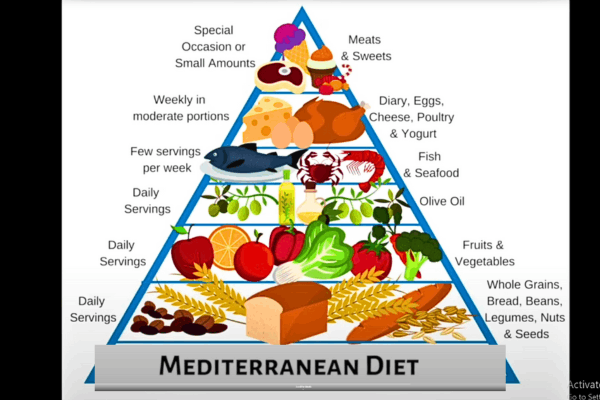There is a breakthrough in mental health field in this complicated and constantly changing reality. Diet and PTSD are issues that attract more public attention today. Our psychological well-being is impacted by what we consume and new studies indicate that following the Mediterranean diet might be the key to diminishing PTSD symptoms.
The Complex Landscape of PTSD
First of all, we will consider what PTSG is and how it can affect the potential impact of the Mediterranean diet. Any one can develop PTSD after experiencing life threatening situations like combat operations, natural and man made disasters and traffic accidents. Intrusive cognition, which involves recurrent nightmares, flashbacks, anxiety, and depression, are the hallmarks of PTSD.
People who have PTSD usually experience other problems including sleep difficulties, emotional numbing, concentration difficulty and sometimes hyper-reactivity to the stimuli associated with the traumatic event. These are not just emotionally harmful, but physiologically as well where one becomes at risk of diseases like cardiac disorder, diabetes, and autoimmunity syndrome.
A Ray of Hope for PTSD: The Mediterranean Diet
The Mediterranean diet is like a breath of fresh air in this complex landscape. It is a dietary pattern inspired by the traditional eating habits of people from countries bordering the Mediterranean Sea. Embracing this diet entails savoring a rich array of fruits, vegetables, whole grains, lean proteins, and healthy fats, all presented with a pinch of Mediterranean charm.

This heart-healthy diet is synonymous with the rich flavors of olive oil, the vibrant hues of fresh produce, and the warmth of shared meals. It offers not only a culinary adventure but also a potential avenue for alleviating PTSD symptoms.
The Gut-Brain Connection
In this dietary revelation, the fascinating relationship among the gut microbiome and mental health lies at its core. Gut microbiome is a complex population of microbes inhabiting our digestive tract. It is like a busy town that hosts hundreds of different species of bacteria, viruses and fungus.
Research into this vibrant world has unveiled its profound influence on mental health. The gut and the brain engage in a constant dialogue via a highway known as the gut-brain axis. This bi-directional communication system allows the gut to send messages to the brain and vice versa.
This dynamic relationship is where the Mediterranean diet steps in. Foods abundant in fiber, antioxidants, and healthy fats can positively impact the gut microbiome, enhancing its diversity and balance. And the result? Potential improvements in mental health, including the management of PTSD symptoms.
The Mediterranean Diet Nutritional Supplement.
To grasp how the Mediterranean diet can be a nutritional elixir, let’s embark on a journey through its key components:
1. Abundant Fruits and Vegetables: A healthy diet consisting plenty of vitamin-rich and mineral-enriched fruits and vegetables is encouraged among its followers. The nutrients work as allies against such disorders thus improving an individual’s health.
2. Extra Virgin Olive Oil: The liquid gold forms the basis of the Mediterranean diet. It is laden with monounsaturated fats with anti-inflammatory as well as neuroprotective functions. This improves the taste of dishes and complements medicinal effects in diet.
3. Lean Proteins: This diet comprises Fish, Poultry, and Legumes as sources of proteins. The brain boosting effects of omega-3 fatty acids in fish diminish the risks for cognitive decline in PTSD patients.
4. Whole Grains: Whole grains like brown rice, quinoa, and whole wheat pasta provide a steady release of energy. This keeps blood sugar levels stable, preventing mood swings and anxiety.
5. Nuts and Seeds: The gut microbiome also gets additional support from these healthy fats and fibers, which serve as other sources. For example, walnuts and flaxseeds contain omegas-3 which improve heart and mind health.
6. Red Wine: Moderate consumption of red wine as a part of the Mediterranean diet is greatly valued. Red grape based resveratrol is a neuroprotection capable of fighting the aftermath of post traumatic issues.
A Potential Therapy for PTSD through Mediterranean Diet.
Here are some key ways in which this diet may contribute to the well-being of individuals living with PTSD:
1. Reducing Inflammation: Chronic inflammation is a common occurrence in individuals with PTSD. The anti-inflammatory properties of the Mediterranean diet can help mitigate this response, potentially easing the severity of symptoms.
2. Enhancing Gut Health: The diet’s emphasis on fiber-rich foods and healthy fats fosters a diverse and balanced gut microbiome.
3. Supporting Brain Health: The Mediterranean diet’s focus on nutrient-dense foods can support cognitive function. A well-nourished brain is better equipped to manage symptoms of anxiety and depression associated with PTSD.
4. Regulating Blood Sugar: The diet’s emphasis on whole grains and lean proteins helps maintain stable blood sugar levels. This can reduce mood swings and enhance emotional stability.
5. Offering a Holistic Approach: The Mediterranean diet is about a holistic approach to eating and well-being. Shared meals with family and friends, the pleasure of savoring food, and the joy of cooking can positively affect mental health.
Scientific Evidence
In their article published 2021, Navickaite et al. investigated the relationship between Mediterranean diet and PTSD symptoms after combat. Veterans whose diets conformed with the Mediterranean diet scored better in PTSD checklists. This study however does not imply causality. Nevertheless, it would provide an avenue for exploring the probable therapeutic benefits of such diets.
Yet, another study in “Molecular Psychiatry” in 2020 examined PTSD and its relation with gut microbiome. The study noted that, in general, the gut microbiota of PTSD patients differed noticeably from the healthy population. The results could not have been directly related to the Mediterranean diet; however, they emphasize the importance of the gut microbiome on mental health.




